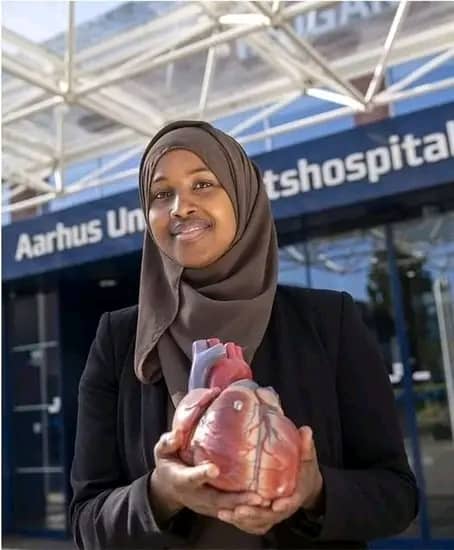A Somali biomedical engineering student, Mariam Noor, studying at Aarhus University in Denmark, has developed an innovative medical device that could transform how doctors treat patients with leaking heart valves — a condition medically known as aortic insufficiency.
After three years of intensive research and design, Mariam created a specialized support ring that helps the heart valve close properly, reducing or even eliminating blood leakage.
This device could remove the need for open-heart surgery, which is currently the main treatment for many valve-related heart conditions.
Cardiologists in Denmark and across Europe have praised Mariam’s invention as a major medical breakthrough, saying it could make heart treatment safer, faster, and more affordable for millions of patients worldwide.
Dr. Anders Petersen, a cardiac surgeon at Aarhus University Hospital, said the device shows “remarkable potential” in early testing.
“This innovation could help patients avoid invasive surgeries and long recovery periods. It’s a leap forward in cardiovascular medicine,” Dr. Petersen said.
Mariam, who was born in Somalia and moved to Denmark to pursue higher education, said her motivation came from seeing how heart disease affects families in Africa.
“Many people in my country can’t afford surgery or advanced care. I wanted to create something simple and effective that could help patients everywhere,” she explained.
Her project began as part of her master’s thesis but has since attracted the interest of medical researchers and investors.
Aarhus University is now working with Mariam to conduct clinical trials and seek European patent approval for the device.
Mariam’s success has made her a role model for young Africans, especially women pursuing careers in science, technology, engineering, and medicine (STEM).
Education experts say her achievement shows how access to quality education and research opportunities can unlock talent from developing nations.
“Mariam’s innovation is not only a medical milestone but also a story of determination, creativity, and hope,” said Professor Lars Jensen, head of Biomedical Engineering at Aarhus University.
If the device passes clinical testing, it could soon be used in hospitals worldwide, saving countless lives and reducing the cost of cardiac care.



